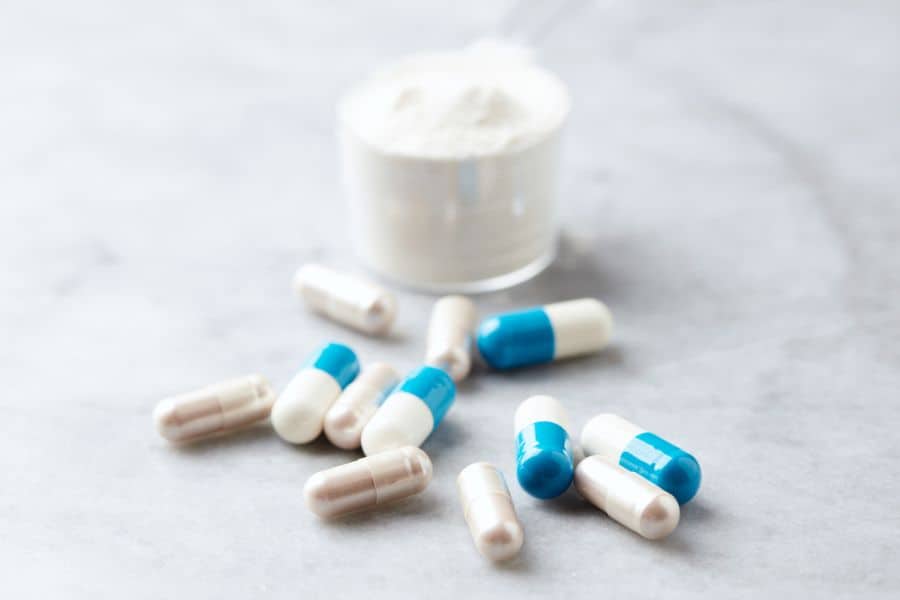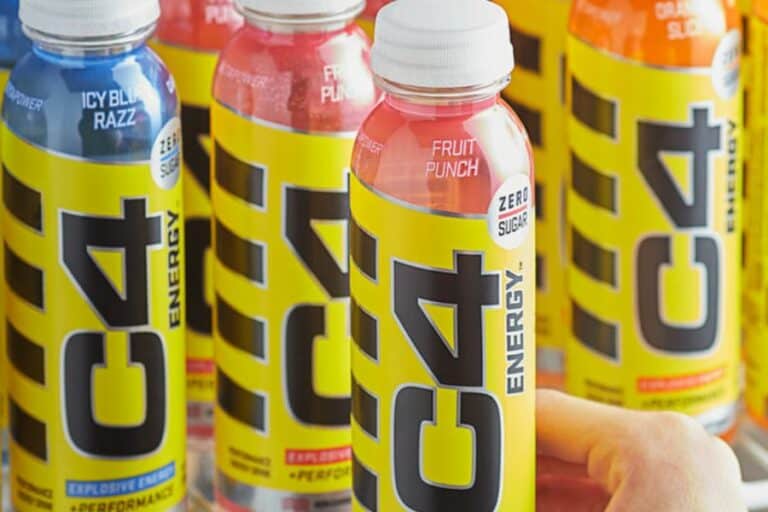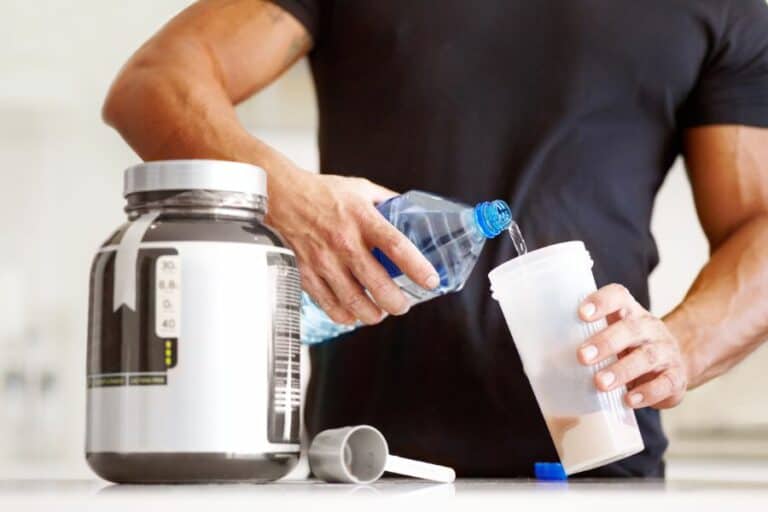Carnitine vs Creatine: How To Choose The Right One?

Carnitine Vs Creatine | Difference In Action | Creatine And Carnitine Together | Risks | Safety Tips | Choosing The Right Supplement
Carnitine is an amino acid derivative that has become a popular dietary supplement. Carnitine supplements are known to aid energy production and fat burning.
Creatine (creatine monohydrate) is also a long-time favorite among fitness lovers. It is a dietary supplement known to boost the growth of fat-free lean muscle mass and improve workout performance.
Both these have been popular supplements for athletes, bodybuilders, and anyone looking to increase their physical performance.
While they offer many of the same benefits in terms of increasing strength and muscle mass, there are some key differences between carnitine vs creatine.
Carnitine vs creatine: Understanding the two supplements
There are key differences between the two supplements that can only be understood by looking at both creatine and carnitine individually.
Carnitine: The basics
Carnitine is an amino acid produced naturally in the body. The body can produce carnitine from two essential amino acids, lysine, and methionine [1]Nutrition & Metabolism: Role of carnitine in disease, in the kidney, liver, and brain. Incidentally, the cardiac and skeletal muscles have the highest concentrations of carnitine.
Carnitine mediates the transport of medium/long-chain fatty acids [2]National Institutes of Health: Carnitine: The Science Behind a Conditionally Essential Nutrient across mitochondrial membranes, facilitating their oxidation with subsequent energy production.
By facilitating the conversion of fat stores into fuel, carnitine, especially carnitine supplementation, supports a healthy level of muscle metabolism. As such, it may be beneficial to fitness enthusiasts who also wish to lose weight.
Overall, carnitine supplements aid fat burning and increase energy levels. Additionally, by playing a role in muscle recovery.
Natural food sources of carnitine
Carnitine can be found primarily in animal products [3]National Institutes of Health: Carnitine, particularly in red meat and other sources such as poultry, fish, and dairy. However, some vegetables, fruits, and grains also contain very small amounts of carnitine.
Since non-animal sources of carnitine may not be enough to fulfill the increased carnitine requirements of vegan athletes, powerlifters, bodybuilders, and general fitness enthusiasts, taking a carnitine supplement becomes necessary.
Energy and performance benefits
Carnitine has gained attention for its potential effects on athletic performance. One of its primary roles is to transport long-chain fatty acids into the mitochondria, where they are oxidized to produce energy.
This process is particularly important during periods of prolonged exercise or low-intensity activities. By enhancing the utilization of fat as a fuel source, carnitine may aid in improving endurance, delaying fatigue, and reducing muscle soreness.
Since carnitine enhances fat oxidation during exercise, it is believed to increase weight loss. However, the evidence of its effectiveness in promoting weight loss is still inconclusive, and further research is needed.
Possible side effects and considerations
It is important to note that while carnitine supplementation is generally considered safe, some individuals may experience gastrointestinal side effects such as nausea, diarrhea, or stomach cramps. Additionally, high doses of carnitine supplementation have been associated with a fishy body odor known as “carnitine breath.”
Creatine: The basics
Creatine is a molecule that helps with energy production and to increase strength and power through weight lifting.
Like carnitine, creatine also occurs naturally in the body, though it can be supplemented for greater effects.
Regular consumption of any creatine supplement like creatine monohydrate or creatine ester helps weight lifters, and bodybuilders gain muscle mass, thus improving overall body composition.
These supplements may help improve performance during short burst, high-intensity exercise, as well as aid in muscle growth.
Natural food sources of creatine
The most abundant sources of creatine [4]Research Gate: Creatine content in select foods are red meat and seafood. These can provide enough creatine sufficient to supplement any day-to-day requirements of this compound.
For people with higher creatine requirements, such as athletes or bodybuilders, the best option is to opt for creatine supplements, which are widely available.
In the case of people who follow dietary restrictions like veganism or vegetarianism, supplementation of creatine becomes even more important. This is because the vegan diet eliminates all animal sources of creatine from their diet, leading to a deficiency of this compound.
Energy and performance benefits
One of the main benefits of creatine supplementation is its potential to increase muscle strength and power.
By increasing the availability of phosphocreatine, creatine supplementation can enhance the resynthesis of ATP during high-intensity, short-duration activities such as weightlifting or sprinting. This can lead to improved performance, allowing individuals to lift heavier weights or perform explosive movements more effectively.
Furthermore, creatine has also been studied for its potential benefits in muscle growth and increase in body mass.
Creatine promotes muscle hypertrophy [5]National Library of Medicine: Creatine Supplementation for Muscle Growth: A Scoping Review of Randomized Clinical Trials from 2012 to 2021 by increasing water content in muscle cells and stimulating protein synthesis.
However, it is important to note that the extent of muscle growth may vary among individuals, and factors such as training status, diet, and genetic factors also play a significant role.
Possible side effects and considerations
While creatine supplementation is generally considered safe, it is essential to highlight potential side effects and considerations. Some individuals may experience gastrointestinal issues when initiating creatine supplementation.
Additionally, creatine may lead to bloating and weight gain due to increased water retention within the muscles. This weight gain is primarily attributed to an increase in intracellular and intramuscular water rather than fat accumulation.
Carnitine and creatine: Differences in action
Now that we have understood both supplement compounds individually, it is easier to decode the differences between carnitine vs creatine.
While both supplements provide energy production, they work in different ways. Let’s explore the differences:
Comparing the mechanisms of action of carnitine and creatine
Carnitine and creatine differ significantly in their mechanisms of action and the specific benefits they offer.
Carnitine primarily impacts endurance and fat loss by facilitating the transport of fatty acids into the mitochondria for energy production.
On the other hand, creatine primarily enhances strength and muscle power by increasing ATP availability and promoting muscle cell hydration.
Carnitine’s impact on endurance and fat loss
When it comes to endurance activities, carnitine supplementation has been of particular interest. By facilitating the transport of fatty acids into the mitochondria, carnitine increases the utilization of fat as an energy source.
Carnitine supplementation may enhance the utilization of fats during exercise and improve endurance performance. This process makes it particularly beneficial for endurance athletes who rely on sustained energy production over long periods.
Creatine’s impact on strength and muscle power
In contrast to carnitine, creatine supplementation primarily targets activities that require short bursts of intense power, such as weightlifting or sprinting.
By increasing phosphocreatine stores in the muscles, creatine enhances the availability of ATP during high-intensity, short-duration activities. This can lead to improvements in strength, power, and speed.
Can I take creatine and carnitine together?
Yes, it is generally safe to take creatine and carnitine together. While they have different mechanisms and benefits, they can complement each other in supporting energy production and muscle function.
However, it’s important to note that not enough studies are available to explain the exact benefits of taking the two supplements together. It may be safe to say that no negative impacts have been recorded around the simultaneous consumption of both.
Risks of carnitine supplementation vs risks of creatine supplementation
Here’s a table comparing the risks of carnitine supplementation and creatine supplementation:
| Risk Factors | Carnitine Supplementation | Creatine Supplementation |
| Gastrointestinal Effects | Possible side effects include nausea, diarrhea, and stomach cramps. | Possible side effects include bloating, cramping, and diarrhea. |
| Cardiovascular Concerns | High-dose supplementation and conversion to trimethylamine N-oxide (TMAO) may be associated with increased cardiovascular risk in some individuals. | No significant evidence of increased cardiovascular risks in healthy individuals. |
| Kidney and Liver Health | Generally considered safe for healthy individuals, but caution should be exercised in those with pre-existing kidney or liver conditions. | No adverse effects on kidney or liver health in healthy individuals. Individuals with pre-existing conditions should consult a healthcare provider. |
| Weight Gain | No significant impact on weight gain. | Possible weight gain due to increased water retention within muscles. |
| Allergic Reactions | Rare cases of allergic reactions reported. | No significant reports of allergic reactions. |
Safety tips for people consuming carnitine and creatine
Now that we know of the potential side effects and risks associated with taking these supplements, here are few safety tips to consider when consuming carnitine and creatine:
- Start with low doses and build up gradually. Monitor the effects of your intake carefully.
- Choose quality supplements from a reliable source and read the nutrient labels and ingredient lists carefully.
- Consume a meal that is rich in both lean protein and healthy fats before taking either of these dietary supplements.
- After taking these two supplements and post-workout, remember to replenish and refuel your body with complex carbohydrates and fiber. Choose your carb sources carefully.
- To ensure maximum effectiveness, it’s best to steer clear of foods that are high in sugar and saturated fats. Such foods may interfere with the absorption of both carnitine and creatine.
- Hydrate sufficiently when taking carnitine and creatine together. This will help reduce the risk of dehydration.
- It is recommended not to consume alcohol while taking supplements as it may hinder the body’s ability to absorb these two dietary supplements.
- Be aware of any drug interactions that may occur when taking carnitine and creatine together.
- Consult a physician or healthcare practitioner before taking any type of dietary supplement. If you experience side effects, stop taking the supplements and consult your doctor.
Carnitine vs creatine: Choosing the right supplement for you
Picking the right supplement for you can be a rather confusing task. Both carnitine and creatine offer unique benefits but work differently in the body.
What supplement suits you better depends on your individual goals and needs and a few other factors. Consider the following before choosing the right supplement:
Individual goals and preferences
Selecting the most appropriate supplement, whether it be carnitine or creatine, depends on individual goals and preferences.
If you are looking for an energy-boosting supplement to enhance your endurance, carnitine may be the best option for you. If you are looking for a supplement that can help with strength and power-based activities, creatine is likely to offer more benefits.
Further, individual weight loss goals can also affect the decision of supplement choice. For instance, even though creatine adds no calories, it may lead to temporary water gain. This makes it more suitable for bodybuilders.
Carnitine, on the other hand, may help to reduce fat mass and overall body weight since it supports fat oxidation. Therefore carnitine might be more suitable for athletes who need leaner body compositions but long-lasting endurance levels.
Compatibility with different training regimes
If the primary focus of your training program is on endurance performance and fat loss, carnitine supplementation may be more suitable. It can enhance the utilization of fats as an energy source during prolonged exercise, potentially improving endurance capacity.
Individuals like powerlifters and bodybuilders often look to improve explosive strength, muscle power, and muscle size. People involved in such training programs may benefit more from creatine supplementation due to its direct impact on ATP production and muscle cell hydration.
Conclusion
Carnitine and creatine are two distinct dietary supplements that offer different benefits and mechanisms of action. Carnitine primarily influences endurance and fat metabolism, while creatine primarily enhances strength, power, and muscle size. Understanding these differences is crucial for individuals looking to optimize their athletic performance and achieve specific goals.
References
| ↑1 | Nutrition & Metabolism: Role of carnitine in disease |
|---|---|
| ↑2 | National Institutes of Health: Carnitine: The Science Behind a Conditionally Essential Nutrient |
| ↑3 | National Institutes of Health: Carnitine |
| ↑4 | Research Gate: Creatine content in select foods |
| ↑5 | National Library of Medicine: Creatine Supplementation for Muscle Growth: A Scoping Review of Randomized Clinical Trials from 2012 to 2021 |







